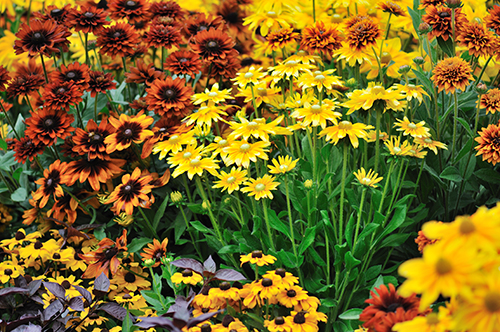Annual versus Perennial
Apr 10, 2023

Whether you already consider yourself a master grower, or whether you’re completely new to the gardening game, you’ve likely run across the terms “annual” and “perennial” quite often. But what exactly is the difference between these two types of plants, and what are the benefits of each?
Keep reading this week’s blog to find out!
Annuals
Annuals are plants that live for only one growing season; therefore, they must be replanted each year. During that season, they will germinate, bloom, propagate, and die. After all, their mission is to bloom rapidly and plentifully.
Annuals’ rapid growth is one of their primary benefits. Many gardeners love the instant gratification of seeing flowers quickly, especially since they tend to boast vibrant colors that will last all season long. Annuals allow for more experimentation of layout, designs, and colors in the garden without the long-term commitment of planting perennials. They are also great plants for beginner gardeners as their life cycle provides a full picture of everything involved in planting, growing, and maintaining a garden in just one season. Because perennials use their first season to build roots, consider planting annual plants in your garden alongside them so that you can still enjoy colorful blooms even while your perennials are not active.
Annual plants are typically less expensive than perennials at the time of purchase. However, because they must be replanted each year, they’re a recurring cost.
Perennials
Perennials are plants that live for more than two growing seasons. They typically die in the winter and reappear in the spring. Perennials build strong root systems during their first growing season, which makes them durable enough to withstand cold temperatures.
Perennials’ longevity is often considered their greatest benefit. This also makes them the most cost-effective choice in the long run. Although you may spend more on the plants upfront, you’ll save money by not having to rebuy and replant them every year. Many perennials must also be divided to prevent overcrowding, which provides additional new smaller plants to share, sell, or plant elsewhere as well.
Perennials are often lower maintenance than annuals, which often require more frequent watering. Of course, there is still some upkeep associated with them, but some perennials such as shrubs are quite self-sufficient. They often bloom at different times during the year, so planting a variety of perennials in your garden at various times will help to keep your garden vibrant all year long.
Incorporating a mix of annuals and perennials in your garden will provide limitless colors, shapes, and textures throughout the year. Visit the garden experts at your local Co-op for seed, soil, fertilizer, tools, and more.
For more content like this, check out the latest issue of The Cooperator.
Keep reading this week’s blog to find out!
Annuals
Annuals are plants that live for only one growing season; therefore, they must be replanted each year. During that season, they will germinate, bloom, propagate, and die. After all, their mission is to bloom rapidly and plentifully.
Annuals’ rapid growth is one of their primary benefits. Many gardeners love the instant gratification of seeing flowers quickly, especially since they tend to boast vibrant colors that will last all season long. Annuals allow for more experimentation of layout, designs, and colors in the garden without the long-term commitment of planting perennials. They are also great plants for beginner gardeners as their life cycle provides a full picture of everything involved in planting, growing, and maintaining a garden in just one season. Because perennials use their first season to build roots, consider planting annual plants in your garden alongside them so that you can still enjoy colorful blooms even while your perennials are not active.
Annual plants are typically less expensive than perennials at the time of purchase. However, because they must be replanted each year, they’re a recurring cost.
Perennials
Perennials are plants that live for more than two growing seasons. They typically die in the winter and reappear in the spring. Perennials build strong root systems during their first growing season, which makes them durable enough to withstand cold temperatures.
Perennials’ longevity is often considered their greatest benefit. This also makes them the most cost-effective choice in the long run. Although you may spend more on the plants upfront, you’ll save money by not having to rebuy and replant them every year. Many perennials must also be divided to prevent overcrowding, which provides additional new smaller plants to share, sell, or plant elsewhere as well.
Perennials are often lower maintenance than annuals, which often require more frequent watering. Of course, there is still some upkeep associated with them, but some perennials such as shrubs are quite self-sufficient. They often bloom at different times during the year, so planting a variety of perennials in your garden at various times will help to keep your garden vibrant all year long.
Incorporating a mix of annuals and perennials in your garden will provide limitless colors, shapes, and textures throughout the year. Visit the garden experts at your local Co-op for seed, soil, fertilizer, tools, and more.
For more content like this, check out the latest issue of The Cooperator.